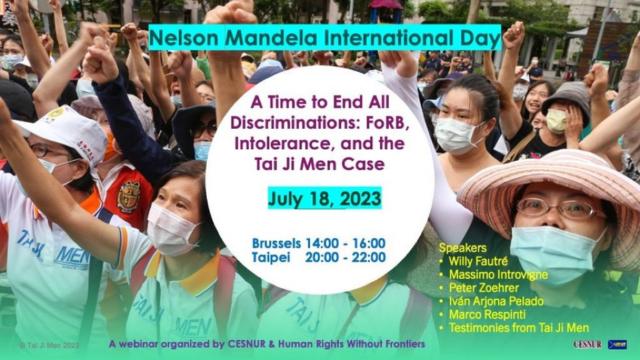Scholars and human rights activists celebrated Mandela Day and called for justice for Tai Ji Men.
by Alessandro Amicarelli

On July 18, 2023, United Nations Nelson Mandela International Day, CESNUR and Human Rights Without Frontiers organized one of their bi-monthly webinars about the Tai Ji Men case. The title was “A Time to End All Discriminations: FoRB, Intolerance, and the Tai Ji Men Case.”
Iván Arjona Pelado, president of the Spanish United Nations ECOSOC-accredited NGO Fundación para la Mejora de la Vida, la Cultura y la Sociedad (Foundation for the Betterment of Life, Culture, and Society), emphasized the importance of freedom of religion or belief as one of the most crucial human rights. He introduced the webinar and a video where Dr. Hong Tao-Tze, the Shifu (Grand Master) of Tai Ji Men celebrated Mandela and said that with bravery and conscience all injustices can be overcome—and even what seems impossible will become possible.
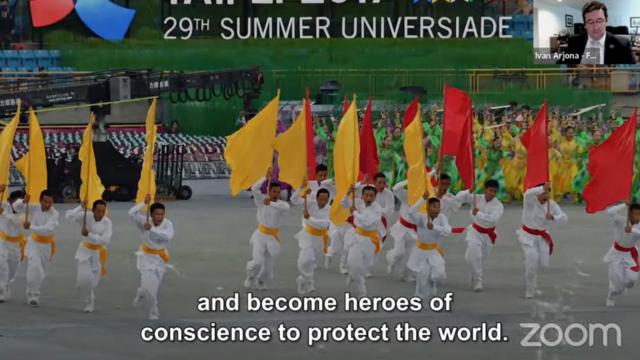
Willy Fautré, co-founder and director of Human Rights Without Frontiers, mentioned that according to a recent debate at the European Parliament we live in a world of unprecedented religious intolerance and persecution. Although Christianity is the most persecuted religion globally, many other religious organizations and spiritual movements are also discriminated and repressed. The European Parliament debate had been organized to commemorate the 10th anniversary of the adoption in June 2013 of the “European Union Guidelines on Freedom of Religion or Belief,” six months before Mandela passed away. The guidelines were a positive development but much remains to be done, Fautré said, not only in totalitarian countries but also in democratic ones, as the Tai Ji Men case demonstrates. Fautré concluded by noting the similarities between Mandela’s and Dr. Hong’s messages against discrimination.
The full video of the webinar.
Arjona Pelado then presented the two speakers of the first session: Massimo Introvigne, an Italian sociologist who serves as editor-in-chief of “Bitter Winter,” and Peter Zoehrer, an Austrian journalist and the executive director of FOREF (Forum for Religious Freedom-Europe).
Introvigne noted that the Tai Ji Men case started with a politically motivated crackdown in 1996 against spiritual movements that had not supported the candidate of the leading party Kuomintang in Taiwan’s first direct presidential elections. Tai Ji Men had not taken any political stand, but this was not good enough for the Kuomintang, which wanted explicit support. This led Introvigne to present on Mandela Day the little-known figure of Mandela’s first wife, Evelyn Mase, who supported him in the early years of poverty and bore him four children.
Evelyn was one of the Jehovah’s Witnesses, a religious organization that counsels its members not to participate in politics; they do not even vote. This was the main reason for Evelyn’s divorce from the hyper-political Mandela. In South Africa, Jehovah’s Witnesses, of which Evelyn remains an active member until her death, were later persecuted for their refusal of participating in politics or joining political parties. Their testimony in South Africa and the one of Tai Ji Men in Taiwan, Introvigne concluded, are powerful testimonies to the fact that religions and spiritual movements have a right both to participate in politics and “not” to participate as they deem fit. This right was not recognized to Tai Ji Men, and this was one of the origins of the case.
Zoehrer compared three great champions of the struggle against discrimination, and for conscience and justice: Dr. Hong, Mandela, and Desmond Tutu. The latter was a famous South African Anglican Archbishop who opposed apartheid and was later called by Mandela to head the Truth and Reconciliation Commission, in charge of promoting transitional justice in post-apartheid South Africa.
Although they operated in different contexts, Zoehrer said, Tutu, Mandela, and Dr. Hong all offered exceptional testimonies for truth, conscience, reconciliation, and justice. Both Tutu and Mandela were honored with the Nobel Peace Prize, Zoehrer concluded. It is now time to nominate Dr. Hong for the same award.

A video by the same Dr. Hong followed, with a speech he delivered for the recent 16th anniversary of the Taiwan Supreme Court 2007 decision recognizing Tai Ji Men as innocent of all charges. It was a comprehensive speech, presenting the activities of Tai Ji Men to promote qigong and self-cultivation, its international activities for peace, love, and conscience, and the long fight for justice, which demonstrated the unbreakable unity between Shifu and dizi (disciples) of Tai Ji Men.
Arjona Pelado then opened the second session, which featured the testimonies of five dizi. Sam Wen, the sales supervisor of a chemical distribution company, compared the bravery of Mandela to the courage demonstrated by his aunt, Wen Xiu-Zhen. After the Tai Ji Men case and the slander campaign started in 1996, the woman accepted to be interviewed by the media and explain what Tai Ji Men was really all about. As a result, her house was searched, she was interrogated, and the media attacked her. Her husband adopted a hostile attitude towards her, her health was affected, and she died in 1999. The episode, Sam Wen said, shows the enormous suffering caused by the Tai Ji Men case.
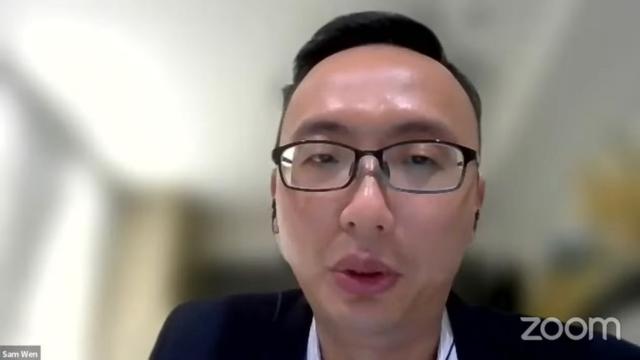
Zona Chen, a primary school teacher, reported that as part of her job she teaches children the value of peace and reconciliation, and is inspired by the example of Mandela. As other speakers, Chen compared Mandela to Dr. Hong and his indefatigable promotion of peace and love through travels around the whole world. Chen emphasized the importance of asking world leaders to ring Tai Ji Men’s Bell of World Peace and Love. She expressed the hope that its powerful sound would resonate also to bring justice to Tai Ji Men.

Brittany Ding, a high school student, quoted Mandela’s famous saying that “People must learn to hate, and if they can learn to hate, they can be taught to love, for love comes more naturally to human heart that its opposite.” When she was told about this statement by Mandela, Ding found it consistent with the teachings of Dr . Hong she had learned as a Tai Ji Men dizi. These were, Ding explained, very practical teachings she applied successfully at school and in her life in the family. She also found the problems of tax injustice in Taiwan easy to understand, and she is now engaged in explaining them to her classmates. She hopes that the younger generation would succeed in promoting the legal and tax reforms that Taiwan badly needs.
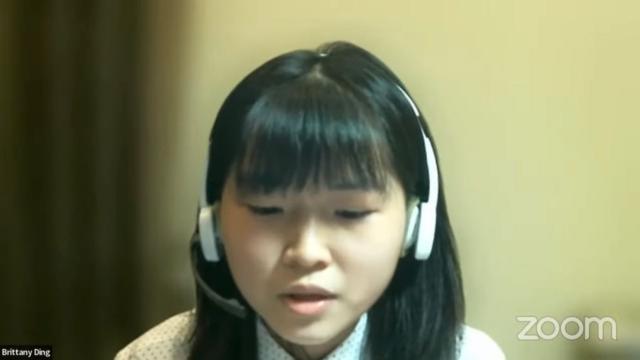
Josie Li, a university student, reported about her passion for presenting the problems of tax injustice in Taiwan. She told the story of how, when she was in ninth grade, she had to ask her teacher to allow her to temporarily leave an important exam session so that she might participate in a tax and legal reform demonstration. When she learned what Li planned to do, the teacher gladly granted her leave. Li also compared the persecutions endured by Mandela and Dr. Hong. In both cases, she said, the leaders’ resilience in face of injustice won international admiration.
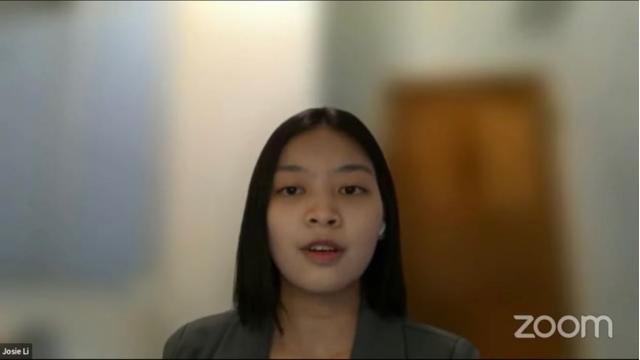
Vivi Hsu, another university student, noted that in Taiwan’s schools the figure of Mandela is presented to students as an example of resistance to injustice. What is not presented is that cases of injustice also exist in democratic Taiwan, many of them perpetrated by tax bureaucrats. Mandela’s teachings, Hsu said, were about not giving up. Tai Ji Men dizi will never give up, she concluded, in advocating for tax and legal reform and ask for the justice they deserve.

Marco Respinti, an Italian journalist and scholar and the director-in-charge of “Bitter Winter,” offered the conclusions of the webinar. He expressed a dissenting opinion on Mandela, noting also his early advocacy of violence as a tool for revolution—although he later repudiated it—and controversial management of the AIDS crisis in South Africa as president. Beyond different evaluations of Mandela, Respinti said, we should all embrace the spirit of Mandela Day, which has the defense of human rights at its core. Freedom of religion or belief (FoRB) is a key part of its rights. Unfortunately, it is not respected in many parts of the world.
One of the most important cases of FoRB violation internationally is the Tai Ji Men case, Respinti said. Because of the questions it implies and the international interest with which it is followed, he concluded, it offers an exceptional opportunity to FoRB. If the Tai Ji Men case is solved, many others will follow suit.
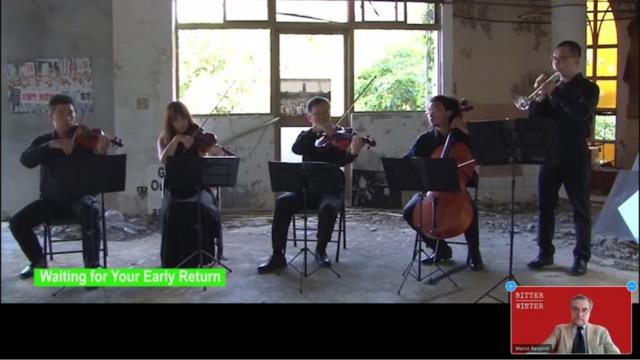
The event concluded with a video featuring a concert by young Tai Ji Men dizi, in the anniversary of the 2007 Supreme Court victory, in the Swiss Mountain Villa, a property bought in 1995 by Dr. Hong and destined to be a large event venue and a self-cultivation center for Tai Ji Men. From 1997 to 2020, the property was first frozen and then used as a collateral in the fabricated tax case against Tai Ji Men. Only in 2020 was the Swiss Mountain Villa finally returned to Dr. Hong. By then, because of the problems that lasted for more than 23 years, the property was in a sad state of abandonment. Now music resonated in the dilapidated building, expressing Tai Ji Men’s love, care, and hope for a better future.
Source: Bitter Winter

